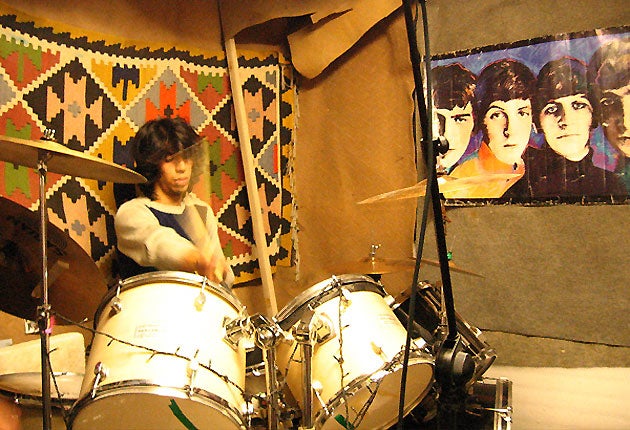Underground to big screen - via music, jail and love

When Cannes Film Festival organisers chose the Iranian film No One Knows About Persian Cats for their line-up, they couldn't have guessed how timely their decision would be.
The film is about the underground music scene in Tehran and is co-written by Roxana Saberi, the US-Iranian journalist released earlier this week after serving four months of an eight-year sentence for allegedly spying for the United States.
Persian Cats is directed and co-written by Saberi’s boyfriend and highly acclaimed director Bahman Ghobadi, who won the Camera d'Or in Cannes for his A Time for Drunken Horses in 2000.
The film, which premieres today, was filmed covertly in September last year and was produced without the official seal of approval from the Iranian authorities.
Promoted as a musical the film centres on the love story between real-life couple and musicians Negar Shaghaghi and Ashkan Koshanejad who play together in the electronic indie band Take It Easy Hospital, which the movie is about. It shows how they struggle to find new band members after Ashkan is released from jail for playing rock music in public, something which is illegal in Iran.
Western styled music is considered “obscene” by the Iranian authorities and it was banned in1979 after the Islamic revolution. Musicians who defy the rules risk harsh punishments such as lashings, fines and imprisonment.
Despite the severity of the punishments there is a thriving underground rock and hip-hop scene in the capital, especially in the more affluent suburbs of northern Tehran. Bands practise in home-built studios and pad the rooms with Persian rugs and mattresses to keep the noise in and nosy neighbours out.
Much of Persian Cats is based on the real experience of 24-year-old Ashkan who in August 2007 organised the first public rock concert in Iran. Ashkan and his rock band Font organised the gig in a small village 25 miles outside Tehran. They invited 100 friends but the news of the concert soon spread and more than 1,200 people attended.
The Iranian police found out about the gig after checking various internet forums and only minutes after Font had finished their first public gig the police scaled the walls surrounding the garden and raided the event. More than 250 people were arrested for what was referred to as “immoral behaviour” such as dancing, drinking alcohol and girls socialising with boys without wearing their hijab.

Watch Apple TV+ free for 7 days
New subscribers only. £8.99/mo. after free trial. Plan auto-renews until cancelled

Watch Apple TV+ free for 7 days
New subscribers only. £8.99/mo. after free trial. Plan auto-renews until cancelled
Inspired by the story, which made headlines in Iran, Ghobadi managed to track down Ashkan and asked him and his 24-year-old girlfriend Negar to play the leads in his new film.
“Being in prison was very difficult. We were scared that we would be locked up for a long time because they didn’t tell how long we would have to stay there,” said Ashkan who now lives with his girlfriend and his other band mates in London after obtaining a six-month entertainment visa to Britain.
“I believed it was the end of what could happen to a musician in Iran but it was also the start of so much more because people from across Iran heard about the underground music scene. I think that this film will show the suffering and the loneliness of what it’s like being a musician in Iran.”
Because of the ban on western style music the film will not be shown in Iran and its director and actors are unsure if they will be able to return to the country after today’s premiere.
“The government will be really pissed off when they hear about it,” he said before travelling to Cannes for the premiere tonight.
“I'm not sure what would happen to us if we tried to go home now, they probably wouldn’t let us into the country,” said Ashkan.
Ghobadi, who also produced Persian Cats, relies on revenues from screenings abroad to make a living - something Iranian musicians cannot do as they are not allowed to perform to an audience. "My movie is a tribute to these people. They want to get on the stage and show their parents their lives have not all gone to waste," he told AFP.
“Many social liberties have been taken away in Iran without a replacement being offered. In this film I'm crying out loud against the status quo,” he said.
Although Take It Easy Hospital’s lyrics are non-political the young musicians know that playing banned music is seen as a political act in itself and they know that the government sees them as a threat which could spark off a “soft revolution”.
“Hopefully this film will reach young and creative Iranians and show them that they are not alone. I also hope it will help to change the mindset of older Iranians that music is not a dangerous thing; it's a creative expression,” said Ashkar.
“I hope that the film will change people’s perceptions of what Iranian society is like and that people will take a closer look at our cultural underground scene.”
Subscribe to Independent Premium to bookmark this article
Want to bookmark your favourite articles and stories to read or reference later? Start your Independent Premium subscription today.

Join our commenting forum
Join thought-provoking conversations, follow other Independent readers and see their replies